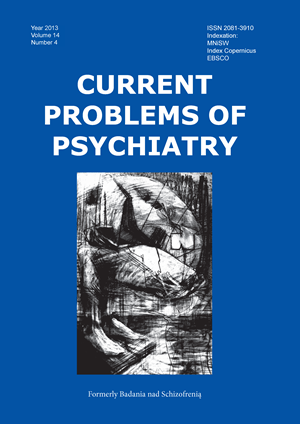Sfery konfliktów małżeńskich w sytuacji rozłąki migracyjnej rodziny z powodu pracy za granicą
Słowa kluczowe:
rodzina migracyjna, konflikty małżeńskie, jakość relacji małżeńskiej, poradnictwo psychologiczne dla małżeństwAbstrakt
Celem artykułu było ukazanie tych sfer życia rodzinnego małżonków doświadczających rozłąki migracyjnej z powodu pracy zarobkowej za granicą, które mają istotne znaczenie dla jakości relacji małżeńskiej oraz postrzegania podjętego trudu migracji w kategoriach rodzinnego sukcesu lub porażki.
Badania zostały przeprowadzone na losowo dobranej próbie w trzech województwach Polski: lubelskim, opolskim i podlaskim. Łącznie udział wzięło 1490 respondentów, z których 38% miało doświadczenie rozłąki migracyjnej w rodzinie. Badania zrealizowano metodą indywidualnego wywiadu standaryzowanego, przy użyciu opracowanego na potrzeby badań kwestionariusza.
Udzielone odpowiedzi pozwoliły na wyodrębnienie 11 sfer funkcjonowania rodziny, które według respondentów stanowią istotne znaczenie dla jakości relacji w rodzinie funkcjonującej na odległość. Do sfer fundamentalnych i scalających relację małżeńską i rodzinną badani zgodnie zaliczyli takie warunki jak: 1) jasno sprecyzowany cel wyjazdu, zaakceptowany przez wszystkich członków rodziny; 2) podtrzymywanie jednomyślności członków rodziny w dążeniu do wyznaczonego celu; 3) dążenie do możliwie częstych wzajemnych odwiedzin oraz 4) wzajemne zapewnianie się małżonków o silnym uczuciu wobec siebie nawzajem. Natomiast, w takich obszarach funkcjonowania swojej rodziny między innymi jak: 1) podział obowiązków czy 2) odpowiedzialność za finanse w rodzinie, małżonkowie różnili się podejmując sprzeczne strategie działań, dążeń czy oczekiwań. Różnice te zostały poddane szczegółowej analizie, ukazując potencjalne obszary konfliktowe w rodzinach migracyjnych. Sformułowano wnioski na użytek pracy doradczej i terapeutycznej z rodziną migracyjną, ukazując funkcjonujące mechanizmy oraz wyznaczając możliwe kierunki pomocy.
Bibliografia
1. Danilewicz W. Rodzina ponad granicami. Transnarodowe doświadczenia wspólnoty rodzinnej. Białystok; Trans Humana: 2010.
2. Łuniewska L. Cena rozłąki. Ozon, 2006; 17/18: 33.
3. Kawczyńska-Butrym Z. Zyski i straty uczestników migracji - wyniki badań własnych. W: Migracje – wyzwanie XXI wieku. red., M.S. Zięba. Lublin; Wyd. EL-Press: 2008: 153-164.
4. Gizicka D., Gorbaniuk J., Szyszka M. Rodzina w sytuacji rozłąki migracyjnej. Lublin; Wydawnictwo KUL: 2010.
5. Chuchra M., Sobieszek M. Migracja zarobkowa a rodzina. W: Rodzina polska i ukraińska wobec wyzwań współczesności. red., J. Gorbaniuk, H. Krysztal, M. Chuchra. Lwów; 2010: 161-176.
6. Kaczmarczyk. P. Migracje zarobkowe w dobie przemian. Warszawa; Wyd. Uniw. Warszawskiego: 2005.
7. Markowski K. Economic Aspects of Migration. W: Migration - a Challenge to the 21st Century. red., Zięba M.S. Lublin; EL-Press: 2008: 37-52.
8. Bryk D. Reemigrantka i jej rodzina w kontekście migracji i readaptacji. W: reemigracja kobiet z terenu województwa lubelskiego. red., K. Markowski. Lublin; KUL: 110-122.
9. Gocko. J. Aspekty etyczne wyjazdów zarobkowych. W: Wyjazdy zarobkowe szansa czy zagrożenie? Perspektywa społeczno-moralna. Człowiek-rodzina społeczeństwo. red., K. Glombik, P. Marciniec. Opole; Wyd. UO: 2005.
10. Satir. V. Terapia rodziny. Gdańsk; GWP: 2002.
11. Wojaczek K. Więź małżeńska w sytuacji rozłąki z przyczyn ekonomicznych. Opole; Wyd. UO: 2007.
12. Wojaczek. K. Rodzina w konfrontacji z migracja zarobkową. W: Wyjazdy zarobkowe szansa czy zagrożenie. Perspektywa społeczno-moralna. red., K. Głombik, P. Marciniec. Opole: Wyd. UO: 2005.
13. Zaleski Z. Emigracja i adaptacja – komu korzyści, a komu straty? W: Migracje – wyzwanie XXI wieku. red., M.S. Zięba. Lublin: Wyd. EL-Press: 2008: 118-121.
14. Lachowska B. Rodzina jako system społeczny w ujęciu Modelu Kołowego Systemów Małżeńskiego i Rodzinnego opracowanego przez D.H. Olsona i współpracowników oraz narzędzia pomiaru. Roczniki Teolog. 2008; 55(10): 167-187.


